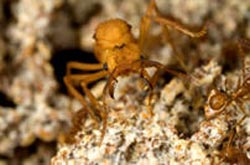Princesses Become Warriors

Source: Dr. Volker Nehring<br><br>Wingless queens of the leafcutter ant genus Acromyrmex that remain sterile and cannot found their own colony alter their behavior completely and, in contrast to fertile queens, help to defend their mother colony.<br>
Biologists from the universities of Freiburg and Copenhagen, Denmark, have discovered that queens of the ant genus Acromyrmex are flexible in the event that they cannot found their own colony.
The queens of other species die as soon as they can no longer fulfill their life’s task. The unsuccessful Acromyrmex queens, on the other hand, change their entire repertoire of behavior and help defend and tend to their mother colony, as the scientists report in the current online issue of the journal Current Biology.
The critical moment in the life of the queens is their nuptial flight, in which they mate with male ants. They then lose their wings and found their own colony. Queens are existentially important for the continued existence of a colony because only they can reproduce. They hide in their nest and avoid all risks. They are defended by the much smaller and sterile female workers or, in some species, soldiers. “We were very surprised to find Acromyrmex queens that defended their nest during our studies in Panama”, says the Freiburg behavioral ecologist Dr. Volker Nehring, who conducted the study.
It was previously assumed that ant queens who lose their wings before their nuptial flight and remain unfertilized simply die. Some of them are also eaten by their sisters, allowing the energy stored in their bodies to be made useful for the colony. However, leafcutter ants feed on a fungus that they grow in their colonies and that provides them with plant nutrients. “We suspect that they have lost the ability to digest meat and recycle their queens,” says Nehring. “There is thus an evolutionary advantage to keeping the sterile queens alive and making them useful for the colony in another way.” They hardly have to feed at all, because they live from reserves and digest their own wing muscles like the fertilized queens.
Upon their return from Panama, where they had conducted field studies supported in part by the Smithsonian Tropical Research Institute, the scientists succeeded in reproducing their observations in the laboratory and studying them more closely. They prevented young queens from reproducing by removing their wings, as often also happens in nature. The wingless queens exhibited a greatly increased level of aggressiveness when exposed to scents from foreign colonies. Unlike their winged sisters they helped take care of the mother’s offspring and engaged in nest building. “It seems as if these princesses knew that they would never be able to mate and found their own colony without wings,” says Nehring. “So the only thing left for them to do was to help their uninjured sisters and defend the nest against invaders like the legendary Amazons.”
Original Publication:
V Nehring, JJ Boomsma, P d’Ettorre. Wingless virgin queens assume helper roles in Acromyrmex leaf-cutting ants. Current Biology, 11 September 2012.
http://www.cell.com/current-biology/fulltext/S0960-9822%2812%2900714-2
Contact:
Dr. Volker Nehring
Institute of Biology I / University of Freiburg
Phone: 0049-761/203-8346
E-Mail: volker.nehring@biologie.uni-freiburg.de
Media Contact
More Information:
http://www.uni-freiburg.deAll latest news from the category: Life Sciences and Chemistry
Articles and reports from the Life Sciences and chemistry area deal with applied and basic research into modern biology, chemistry and human medicine.
Valuable information can be found on a range of life sciences fields including bacteriology, biochemistry, bionics, bioinformatics, biophysics, biotechnology, genetics, geobotany, human biology, marine biology, microbiology, molecular biology, cellular biology, zoology, bioinorganic chemistry, microchemistry and environmental chemistry.
Newest articles

Trotting robots reveal emergence of animal gait transitions
A four-legged robot trained with machine learning by EPFL researchers has learned to avoid falls by spontaneously switching between walking, trotting, and pronking – a milestone for roboticists as well…

Innovation promises to prevent power pole-top fires
Engineers in Australia have found a new way to make power-pole insulators resistant to fire and electrical sparking, promising to prevent dangerous pole-top fires and reduce blackouts. Pole-top fires pose…

Possible alternative to antibiotics produced by bacteria
Antibacterial substance from staphylococci discovered with new mechanism of action against natural competitors. Many bacteria produce substances to gain an advantage over competitors in their highly competitive natural environment. Researchers…





















